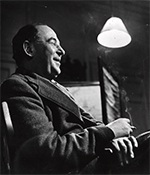
The Problem of Pain
"God whispers to us in our pleasures, speaks in our conscience, but shouts in our pain:
it is His megaphone to rouse a deaf world" (91).
C. S. Lewis's The Problem of Pain (1940)
Points for Reflection
Chapter Six ("Human Pain")
- Lewis maintains that God uses one kind of pain to birth a better sort of growing pain: the suffering brought about by sin prompts humans to willingly pursue mortification/usurpation of the sinful self currently in control (89-90, 93-95). Do you agree that suffering often prompts self-reflection and change?
- why does Lewis embrace the human instinct that "bad men ought to suffer" instead of rejecting it as base and unenlightened (91-92)?
- do you agree with Lewis' assertion that "the ugliest things in human nature are perversions of good or innocent things" (92)?
- does Lewis' suggestion that God allows suffering to upened the happiness of honest, hard-working people in order to draw them closer to himself make God seem, ultimately, cruel or compassionate (95)?
- according to Lewis, why might God regard the vices of prostitutes more leniently than those of successful bankers (96)?
- do you agree that one cannot be assured that s/he is acting for God's sake unless the action s/he takes is in some way painful--contrary to her/his inclinations (97-98)?
- as Lewis would have it, that obedience to the Divine will which constitutes free surrender of oneself is necessarily unpleasant and void of desire (99-100). Do you agree?
- Lewis has obviously self-deprecated as sinful that self-reliant pride which refuses to acknowledge one’s need for the Creator. What type of self-sufficiency does he later promote, suggesting that pain actually catalyzes it (101-102)?
- what action does Lewis identify as "the supreme enacting and perfection of Christianity" (102)?
- Lewis maintains that the idea of death's giving birth to life can be found throughout history, across many cultures (102-104). Is this true of contemporary, western culture? Do we find this same idea in elements of our own lives--in popular narratives, dominant philosophies, and/or political practice?
- how does Christianity, according to Lewis, render "the doctrine of death . . . more tolerable" (102-104)?
- what two emotions does Lewis include in his mapping of the "tribulational system" activated by and centred around pain (105-107), and in what ways can the imagination abuse these two emotions, creating an unhealthy attitude towards suffering (107-109)?
- identify the similar posture towards poverty shared by Marxism and Christianity (109).
Chapter Seven ("Human Pain , Continued")
- what aspects of suffering does Lewis value (110)?
- how does “simple evil” produce “complex good” (111)?
- does Lewis recommend wholly eschewing ascetic practices and forms of self-torture like fasting (112-13)?
- how does Lewis reconcile the blessings of suffering with the call to love others sacrificially (110-14)?
Chapter Eight ("Hell")
- which does Lewis attempt in chapter eight, to make Hell appear "tolerable" or "moral" (121)?
- does the detailed sketch of a sinful man provided by Lewis (122-23) seem fantastic, or does it have the ring of reality? Does the portrait seem parodic and hyperbolic, or grounded and familiar?
- do you agree w/ Lewis’ claim that forgiveness, to be complete, must not only be offered but accepted (124)?
- what does Lewis mean by the suggestion that perdition might be an already present reality as much as it is an imposed judgment & relocation (124-25)?
- according to Lewis, does offering someone forgiveness ensure that forgiveness is "complete" (124)?
- Lewis links the very capacity for enjoying good to the taste for what (125)? What does he mean by this?
- does Lewis conceive of eternity as a line, plane, or solid (125)?
- which does Lewis privilege when conceiving of Hell: visions of torture and suffering, or utter destruction and privation (127-28, 128-29)?
- which does Lewis privilege when conceiving of Hell: visions of torture and suffering, or utter destruction and privation (127-28, 128-29)?
- what do you think of Lewis' recommendation that any consideration of Hell remain personal--that we always consider the possible damnation not only of easy, exterior targets, but of ourselves (130-31)?
Chapter Nine ("Animal Pain")
- coming soon!
Chapter Ten ("Heaven")
- what does Lewis mean by the claim that "Heaven offers nothing that a mercenary soul can desire" (149).
- Lewis argues that humanity's longing for heaven is irrefutable, woven into our unfulfilled desires and inexplicable, unmet longings--we each hunger for a unique, custom-made thing that remains tantalizingly out of our reach (149-52). Can you identify yearnings in your own life, "unattainable ecstas[ies]" (152) that fit these criteria?
- does Lewis believe that, in heaven, God celebrates the diversity of humanity, or remolds it into infinite sameness (151-52, 154-55)?
- Lewis likens life on earth as training for life eternal, which he compares to what two, particular forms of revelry (158-59)?
- Lewis often draws attention to the incompleteness and limitations of his own ideas, as well as to his ignorance (82-83, etc.) Do these kinds of admissions endear him to you, or prompt you to respect him less?

C. S. Lewis
by John Chillingworth
Dr. Paul Marchbanks
pmarchba@calpoly.edu
![]()
